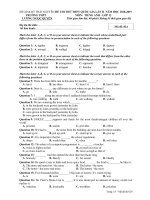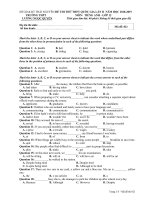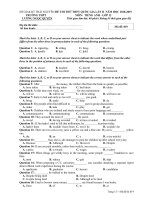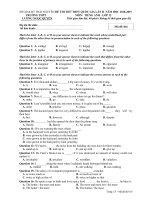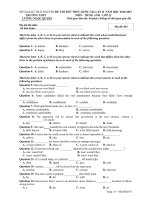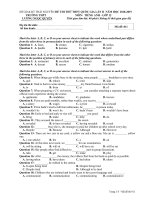Đề thi thử THPT QG môn tiếng anh năm 2019 lần 2 THPT lương ngọc quyến mã đề 024
Bạn đang xem bản rút gọn của tài liệu. Xem và tải ngay bản đầy đủ của tài liệu tại đây (153.69 KB, 5 trang )
SỞ GD & ĐT THÁI NGUYÊN ĐỀ THI THỬ THPT QUỐC GIA LẦN II NĂM HỌC 2018-2019
TRƯỜNG THPT
MÔN: TIẾNG ANH - LỚP 12
LƯƠNG NGỌC QUYẾN
Thời gian làm bài: 60 phút ( không kể thời gian giao đề)
Họ tên thí sinh: …………………………………………
Số báo danh: …………………………………………...
Mã đề: 024
Mark the letter A, B, C, or D on your answer sheet to indicate the word whose underlined part
differs from the other three in pronunciation in each of the following questions
Question 1: A. feather
Question 2: A. missed
B. measure
B. walked
C. leather
C. helped
D. feature
D. arrived
Mark the letter A, B, C, or D on your answer sheet to indicate the word that differs from the other
three in the position of primary stress in each of the following questions.
Question 3: A. disappear
B. arrangement
C. opponent
D. contractual
Question 4: A. impatient
B. arrogant
C. familiar
D. uncertain
Mark the letter A, B, C, or D on your answer sheet to indicate the correct answer to each of the
following questions.
Question 5: There has been little rain in this area for months, ______?
A. has it
B. has there
C. hasn’t it
D. hasn’t there
Question 6: Does it _______ any difference to you where we go for dinner?
A. go
B. take
C. make
D. do
Question 7: I _______along the street when I suddenly heard footsteps behind me.
A. was walking B. walk
C. am walking
D. walked
Question 8: We are watering the trees which _______.
A. in the backyard were grown yesterday by John
B. were grown by John yesterday in the backyard
C. were grown in the backyard yesterday by John
D. were grown in the backyard by John yesterday
Question 9: UNICEF
supports and funds for the most disadvantaged children all over the
world.
A. presents
B. assists
C. provides
D. offers
Question 10: We had to ______ the noise from the building site next door for three months.
A. look up to
B. put up with
C. stand up to
D. give up
Question 11: It is imperative that he _______ the school regulations.
A. obeys
B. would obey
C. obey
D. will obey
Question 12: The salary of a computer programmer is _________ a teacher.
A. twice as higher as that
B. as much as twice of
C. as twice much as
D. twice as high as that of
Question 13: ________ had she opened the door than the phone rang.
A. Scarcely
B. Barely
C. No sooner
D. Hardly
Question 14: He spent a year in India and loves spicy food. _______ the food is, _______ he likes it.
A. The more and more hot / the more
B. The hotter / the more
C. The hotter / the more and more
D. The hottest / the most
Question 15: Five thousand dollars_______ a big sum of money. It’s worth trying.
A. is
B. were
C. are
D. was
Question 16: Da Vinci’s Mona Lisa is _____; if it was destroyed no amount of money could ever
replace it.
A. valueless
B. invaluable
C. worthless
D. priceless
Trang 1/5 - Mã đề thi 024
Question 17: The doctors know that it is very difficult to save the patient's life,
, they will try
their best.
A. although
B. however
C. despite
D. but
Question 18: I can’t possibly lend you any more money, it is quite out of the
.
A. place
B. question
C. order
D. practice
Mark the letter A, B, C, or D on your answer sheet to indicate the word(s) CLOSEST in meaning to
the underlined word(s) in each of the following questions.
Question 19: When being interviewed, you should concentrate on what the interviewer is saying or
asking you.
A. be related to
B. be interested in
C. express interest to D. pay attention to
Question 20: The trouble with Frank is that he never turns up on time for a meeting.
A. goes
B. arrives
C. switches
D. gets
Mark the letter A, B, C, or D on your answer sheet to indicate the word(s) OPPOSITE in meaning
to the underlined word(s) in each of the following questions
Question 21: When I was going shopping yesterday, I accidentally met one of my old friends in high
school.
A. on purpose
B. by far
C. by chance
D. by heart
Question 22: The chairman initiated the proceedings with a brief speech.
A. started
B. closed
C. confused
D. complicated
Mark the letter A, B, C, or D on your answer sheet to indicate the option that best completes each
of the following exchanges
Question 23: Peter: “Is it important?” Thomas: “________”
A. It’s a matter of life and death!
B. No worry, that’s nothing.
C. Not on your life!
D. It’s ridiculous !
Jim:
"No, thanks."
Question 24: Jordan: "________"
A. Would you care for another drink?
B. Come in, please! Breath!
C. Would you want another drink?
D. Can you help me with this?
Read the following passage and mark the letter A, B, C, or D on your answer sheet to indicate
the correct word or phrase that best fits each of the numbered blanks from 25 to 29
(25)______ you first arrive in a foreign country, your initial reaction is often completely positive.
Everything seems exciting, different and fascinating. It's an adventure. If you're just on a short
holiday, you'll probably never leave this phase, but if you stay longer, your attitude towards your
(26)______ environment can start to change.
As soon as you start to realize how little you understand the new culture, life can get frustrating.
People misunderstand (27)______ you're trying to say, or they may even laugh at you for saying
something incorrectly. Even simple things, like posting a letter, can seem impossibly difficult, and
you are likely to (28)______ by getting angry or upset when things go wrong.
With time, however, you start to adjust to become more comfortable with the differences and
better able to handle frustrating and embarrassing (29)______. Your sense of humour reappears.
Finally, you reach the stage of feeling able to be enthusiastic about the culture once again, enjoy
living in it, and maybe even prefer certain aspects of the culture to your own.
(Source: www.english-grammar.at)
Question 25: A. Although
B. However
Question 26: A. old
B. new
Question 27: A. how
B. what
C. Dispite
C. original
C. which
D. When
D. natural
D. where
Trang 2/5 - Mã đề thi 024
Question 28: A. outdo
B. overflow
Question 29: A. circumstances B. situations
C. overcome
C. conditions
D. overreact
D. locations
Read the following passage and mark the letter A, B, C, or D on your answer sheet to indicate the correct
answer to each of the questions from 30 to 34.
DRINKING AND DRIVING
The legal limit for driving after drinking alcohol is 80 milligrams of alcohol in 100 milliliters of
blood, when tested. But there is no sure way of telling how much you can drink before you reach this
limit. It varies with each person depending on your weight, your sex, if you’ve just eaten and what
sort of drinks you’ve had. Some people might reach their limit after only about three standard drinks.
In fact, your driving ability can be affected by just one or two drinks. Even if you’re below the
legal limit, you could still be taken to court if a police officer thinks your driving has been affected by
alcohol.
It takes about an hour for the body to get rid of the alcohol in one standard drink. So, if you have a
heavy drinking session in the evening you might find that your driving ability is still affected the next
morning, or you could even find that you’re still over the legal limit. In addition, if you’ve had a few
drinks at lunchtime, another one or two drinks in the early evening may well put you over the legal
limit.
In a test with professional drivers, the more alcoholic drinks they had had the more certain they
were that they could drive a test course through a set of moveable posts … and the less able they were
to do it!
So the only way to be sure you’re safe is not to drink at all.
Alcohol is a major cause of road traffic accidents. One in three of the drivers killed in road
accidents have levels of alcohol which are over the legal limit, and road accidents after drinking are
the biggest cause of death among young men. More half of the people stopped by the police to take a
breathalyzer test have a blood alcohol concentrate of more than twice the legal limit.
It is important to remember that driving after you’ve been drinking doesn’t just affect you. If
you’re involved in an accident it affects a lot of other people as well, not least the person you might
kill or injure.
Question 30: The amount of alcohol a person can drink before reaching the legal limit is
___________.
A. different for different people
B. exactly proportional to body weight.
C. approximately three standard drinks
D. 800 milligrams of pure alcohol
Question 31: When might you be taken to court by the police for drinking and driving?
A. When the police think that you have been drinking from the way you are driving.
B. Only when tests show that you have 80mg of alcohol in 100 ml of blood.
C. When you have driven a vehicle after drinking any alcohol at all.
D. When you have drunk at least three drinks before driving.
Question 32: When you have been drinking heavily in the evening, the next day you might be
_______.
A. unable to drive until the evening
B. unable to drive all day
C. over the legal limit in the morning
D. still drunk until lunchtime
Question 33: Alcohol is a major cause of road traffic accidents in that ___.
A. most drivers who die in these accidents have been drinking
B. drinking affects people’s eyesight
C. more young men die in drink-related accidents than in any other way
D. one in three drivers drink heavily
Question 34: What does this article urge you to remember particularly about driving and drinking?
A. You put many other people at risk.
B. You are putting yourself in danger.
C. You may hurt another road-user.
D. You may be taken to court by the police.
Trang 3/5 - Mã đề thi 024
Read the following passage and mark the letter A, B, C, or D on your answer sheet to 35 to 42.
Have you ever thought about inventing something? Did you worry that your idea was too strange
or unrealistic? Well, maybe you should think again. Strange or unrealistic ideas never stopped Arthur
Pedrick. Pedrick was a British inventor. Originally a government clerk, he spent his retirement in the
1960s and 1970s developing new and unusual ideas. Some of these ideas contradicted basic physics,
but that didn’t stop Pedrick. One of his strangest ideas was a plan to connect large tubes from the
continent of Australia all the way to Antarctica, a distance of 10,000 km! These tubes would carry
giant ice balls from Antarctica to Australia. This ice would then melt in the Australian desert, and the
water would be used in irrigation. Another of Pedrick’s inventions was a radio-controlled golf ball. A
golfer could change the speed and direction of the golf ball by small flaps, controlled by computer
chips. Using radio waves, the golfer could also find lost golf balls. Arthur Pedrick had thousands of
bizarre ideas for inventions, most of which were never built.
Though many of Pedrick’s inventions were never developed, a lot of other strange ideas
were. In 1989, a company designed and sold a theft-prevention device for expensive cars. As part of
this device, several tubes were attached to the bottom of a car. If someone tried to steal the car, super
hot flames would come out of the tubes and burn the car thief. Some people who were not thieves,
however, were seriously injured. They accidentally set off the device by walking past the car. Other
strange inventions include underwear for dogs and pens with drinkable ink. The underwear keeps
dogs from making a mess when they go out for a walk. Also, if you are ever thirsty during a test, a
pen with drinkable ink would be very handy! If you have an idea that seems a little out in left field,
don’t let that stop you from trying it. You’ll be in good company.
Question 35: What is the main idea of the passage?
A. Some devices can help reduce crime.
B. Some inventions are very strange.
C. Inventions are necessary for a good life.
D. Inventing something is easy.
Question 36: According to the passage, what is NOT true about Pedrick?
A. He came up with the idea of carrying iceberg from Antarctica to Australia.
B. He had ever worked as a secretary for the government.
C. A lot of his inventions were based on physics.
D. He comes from England.
Question 37: According to the passage, how was Pedrick’s plan to bring water to Australia probably
unrealistic?
A. Australia doesn’t need water.
B. Tubes are not strong enough.
C. Australia and Antarctica are too far away. D. The plan was too expensive.
Question 38: What was the problem with the theft prevention device?
A. Only bicycles could use it.
B. It was too big.
C. It hurt other people besides thieves.
D. It didn’t work.
Question 39: In the passage, what is implied when a dog “makes a mess”?
A. It spreads its food around.
B. It has dirty hair.
C. It digs in the dirt.
D. It goes to the bathroom.
Question 40: The word “they” in paragraph 2 refers to_______.
A. people
B. thieves
C. dogs
D. pens
Question 41: The words “out in left field” in paragraph 2 is closest in meaning to_______.
A. innovative
B. inventive
C. weird
D. creative
Question 42: From the passage, what can be inferred about Arthur Pedrick?
A. He was a good scientist.
B. He was more interested in creativity than facts.
C. He was often bored.
D. He made a lot of money from his inventions.
Mark the letter A, B, C, or D on your answer sheet to indicate the underlined part that needs
correction in each of the following questions.
Question 43: As a child grows on, its physical health is affected by many elements in the air, water
A
B
C
D
Trang 4/5 - Mã đề thi 024
and food.
Question 44: The examination will test your ability to understand spoken English, to read nonA
B
technical language and writing correctly.
C
D
Question 45: The assumption that smoking has bad effects on our health have been proved.
A
B
C
D
Mark the letter A, B, C, or D on your answer sheet to indicate the sentence that is closest in
meaning to each of the following questions
Question 46: “I’m very pleased at how things have turned out”, she said to her employees.
A. She wanted her employees to tell her how many things had turned out.
B. She asked her employees how things had turned out and was pleased to know it.
C. She complimented her employees for making things turn out.
D. She expressed her satisfaction with the way things had turned out.
Question 47: He decided not to go to university and went to work in a restaurant.
A. He went to work in a restaurant instead of going to university.
B. Instead of going to university, he went to work in a restaurant.
C. Despite of going to university he went to work in a restaurant.
D. He decided to go to work in a restaurant because he liked it.
Question 48: Many people think that Steve stole the money.
A. Steve was thought to have stolen the money.
B. Steve was thought to steal the money.
C. It is thought that Steve stole the money.
D. The money is thought to have stolen by Steve.
Mark the letter A, B, C, or D on your answer sheet to indicate the sentence that best combines each
pair of sentences in the following questions.
Question 49: We arrived at airport. We realized our passports were still at home.
A. We arrived at the airport and realized that our passports arc still at home,
B. Not until had we arrived at the airport we realized our passports were still at home.
C. It was until we arrived at the airport that we realize our passports were still at home.
D. Not until we arrived at the airport did we realize that our passports were still at home.
Question 50: He is very intelligent. He can solve all the problems in no time.
A. So intelligent is he that he can solve all the problems in no time.
B. So intelligent a student is he that he can solve all the problems in no time.
C. He is very intelligent that he can solve all the problems in no time.
D. An intelligent student is he that he can solve all the problems in no time.
----------- THE END ----------
Trang 5/5 - Mã đề thi 024
